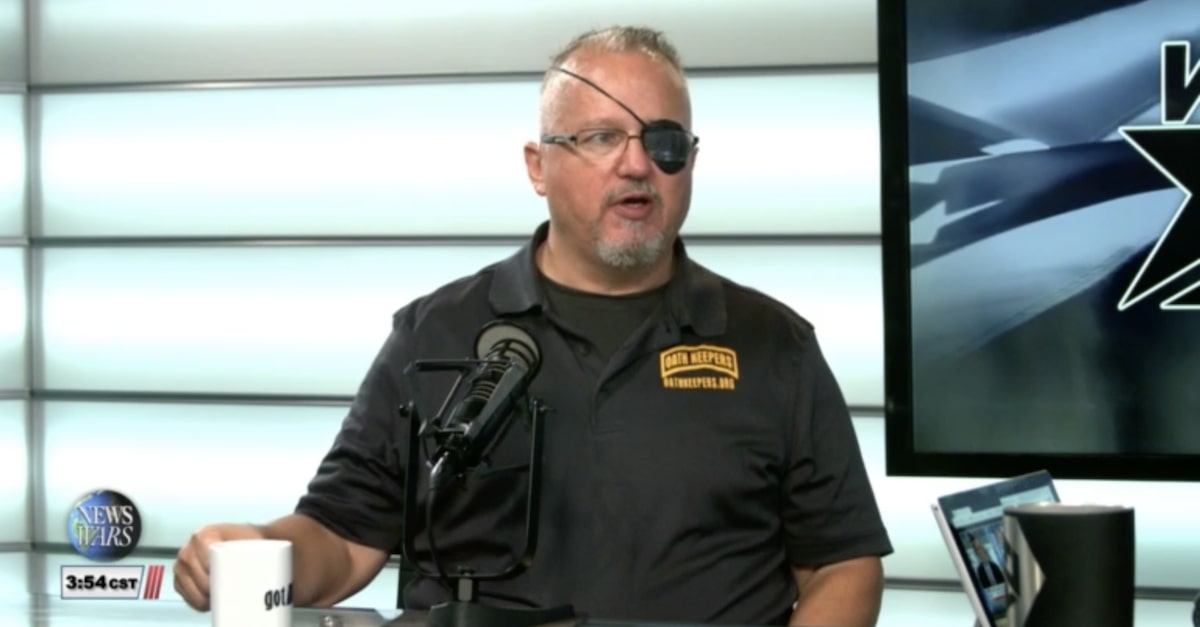
Screenshot of Oath Keepers leader Stewart Rhodes on Infowars
Stewart Rhodes and his alleged co-conspirators in the Oath Keepers cannot dismiss seditious conspiracy and obstruction of Congress counts, a federal judge ruled.
The judge also denied their attempt to keep their case out of Washington, D.C., rejecting their arguments that they cannot get a fair trial in the deep-blue nation’s capital.
Federal prosecutors unveiled their indictment with seditious conspiracy charges against Rhodes and several other Oath Keepers members earlier this year on Jan. 13, and the ruling provides a deep historical overview of the charge.
“At the start of the Civil War, the national government had limited authority under federal criminal law to detain and punish those who supported the rebellion,” U.S. District Judge Amit Mehta explained at the start of the subheading of his ruling titled “Historical Background.” “The charge of treason, which carried the death penalty, was the primary tool available, but the Constitution defined that offense strictly, and judicial opinions imposed rigorous elements of proof.”
Mehta noted that the Congress passed the charge that came to be known as seditious conspiracy approximately 100 days after shots were fired at Fort Sumter, launching the first battle of the Civil War.
“One of the bill’s sponsors, Senator Lyman Trumbull of Illinois, explained that the ‘object of this bill is not under any other name to punish traitors, but it is to punish persons who conspire together to commit offenses against the United States not analogous to treason,”” the ruling states.
The judge noted that the Enforcement Act of 1871, also known as the Ku Klux Klan Act, used nearly identical wording to the conspiracy provisions of what eventually became the seditious conspiracy, punishing those who attempt “by force to prevent, hinder, and delay the execution of any law of the United States.”
The Oath Keepers disputed that the allegations against them fall under that provision, but Judge Mehta noted “the court has little trouble concluding that the Vice President and members of Congress were engaged in ‘the execution of any law of the United States’ on January 6th.”
READ RELATED: Two Woman, One Man Charged with Luring De’ja McCrary to Fatal Ambush
Mehta, a Barack Obama appointee, also followed the path of the vast majority of other federal judges in his district who gave the green light to the obstruction charge.
The Oath Keepers members also tried to move their case to the Eastern District of Virginia, submitting polling from In Lux Research purporting to show that it would be too difficult to find an unbiased jury in Washington, D.C.
Mehta noted that, even if the nation’s capital were a tough jurisdiction for them, so would be their preferred option.
“The two jurisdictions are not so dissimilar as it relates to the events of January 6th,” the ruling notes. “Both are part of the same media market, so potential jurors are getting January 6th news coverage from largely the same sources in both jurisdictions. People who work or do business at the U.S. Capitol Building often live in and commute from the northern Virginia suburbs. Residents of Arlington County and Alexandria were subject to a curfew on January 6th, and the Governor of Virginia issued a state of emergency and sent the Virginia National Guard and state troopers to assist on Capitol Hill the same day.”
The judge reiterated his findings in a parallel case involving Oath Keepers member Thomas Caldwell that the defendant did not show “actual bias” by potential jurors. Caldwell was subsequently added to Rhodes’ indictment. The other defendants who lost the motions at issue in the ruling are Kelly Meggs, Kenneth Harrelson, Jessica Watkins, Roberto Minuta, Joseph Hackett, David Moerschel and Edward Vallejo.
Read the ruling, below:
(Screenshot from InfoWars)
Have a tip we should know? [email protected]
Source:





